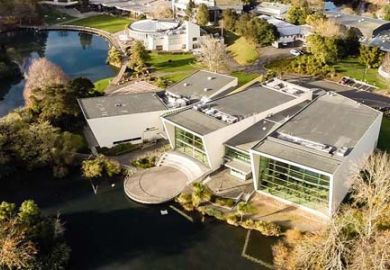In the aftermath of last month’s ill-fated Budget, Paul Johnson, director of the Institute for Fiscal Studies, was – as usual – as ubiquitous as the chancellor of the Exchequer. The institute’s modelling and analysis are authoritative, and its judgements can make or break tax and spend proposals even from the mighty Treasury – as witnessed by George Osborne’s climbdowns over cutting disability benefits and, last November, tax credits.
But where in all this was the Economic and Social Research Council: the 50-year-old government agency that, in supporting the IFS, realises its responsibility for economic data and deciphering political decisions? A three-page pre-Budget profile of the IFS in The Guardian unfolded without a single mention of its principal funder. Similarly, in his recent report to the Treasury about UK economic statistics, Sir Charlie Bean – Bank of England economist and professor at the London School of Economics – had a lot to say about data, markets, changing social and economic behaviour and how to find out what is going on. It’s the stuff of social science. But he gave the ESRC only a single, glancing reference.
To criticise the ESRC for being so far below the radar is to make a category error, some will say. It’s a research council. It’s a facilitator not a doer; the arm in “arm’s length body” must be long, insulating the ESRC from the daily concerns of government. The IFS is out front; the ESRC makes that possible. (In fact the IFS is a charity; it’s the Centre for Microeconomic Analysis of Public Policy, embedded within it but directed by academics at University College London, that the ESRC supports.)
But that can’t be the whole story. By investing £150 million a year in research into issues such as class, inequality, organisational effectiveness (including that of schools), taxation and productivity, the ESRC is inescapably more attuned to policy and politics than other research councils. A recent investigation by MPs, for instance, described low productivity as “the most important problem the UK economy faces”. Yet the ESRC was absent from the list of those submitting evidence to the inquiry.
The council does brand some of the findings it pays for, even in such turbulent areas as the referendums on Scotland’s future in the UK and the UK’s future in the European Union. But the usual protocol is to put the academics’ or their institutions’ names first; the ESRC does well if it get its logo at the foot of the press release.
The vision of its first chair, Michael Young, was that the Social Science Research Council (as it was then known, having adopted “economic” only in the 1980s at the behest of the Thatcher government) should itself be a centre of thought and research: the go-to place for ministers for forecasting and uncovering puzzles, such as how far deprivation is “transmitted” between generations. Young and his successor, Andrew Shonfield, set up in-house research units, but the organisation has gradually become much more academic, in line with the other research councils. Implementing the Nurse review, which recommends an even more unified research council structure, could complete the process.
Yet tensions in the ESRC’s identity won’t dissipate. The other research councils confront no equivalent of, say, migration: a subject shot through with politics and ideology, and always likely to attract the attention of the Daily Mail. However gingerly it’s approached, however much grant-receivers carry the can for their findings, the research council carries some accountability for the shape and quality of the knowledge out there, and the debate. Successive ESRC chairs and chief executives have been adroit, but have usually decided that discretion was the better part of valour and kept a low profile.
If money is the measure of effectiveness, their tactic has worked. The latest allocation puts the ESRC in steady state, with the chance of gains from the redirected overseas aid money in the Global Challenges Research Fund. This is no mean feat. But a price has had to be paid. Inside Whitehall, the formula has been to stick with its parent department, Business, Innovation and Skills, and not to challenge the deficiencies and fragmentation in social science advice and data across government departments and agencies. That the Cabinet Office did not pause to consider the consequences for research councils of its recent edict banning lobbying by state-funded entities says something about the salience of the council with which it has most direct contact.
Maybe the knowledge the ESRC funds percolates into public consciousness; maybe public attitudes and beliefs have been shaped by it indirectly. We don’t know. The ESRC hasn’t been self-reflexive and, for all its insistence that grant applicants should have impact, we know little about its own impact over the long haul. Perhaps it should take the opportunity afforded by this year’s 50th birthday celebrations to reflect on whether it is acceptable that few in the wider world seem to know the party is even happening.
David Walker was until recently head of policy at the Academy of Social Sciences, and was on the board of the ESRC between 2006 and 2013. His most recent book is Exaggerated Claims? The ESRC, 50 Years On.
POSTSCRIPT:
Print headline: Is the ESRC flying below the radar – or left out of the loop?
Register to continue
Why register?
- Registration is free and only takes a moment
- Once registered, you can read 3 articles a month
- Sign up for our newsletter
Subscribe
Or subscribe for unlimited access to:
- Unlimited access to news, views, insights & reviews
- Digital editions
- Digital access to THE’s university and college rankings analysis
Already registered or a current subscriber? Login




